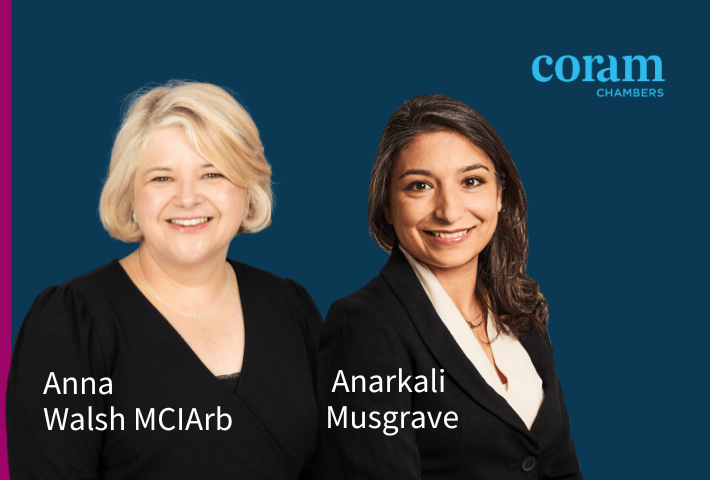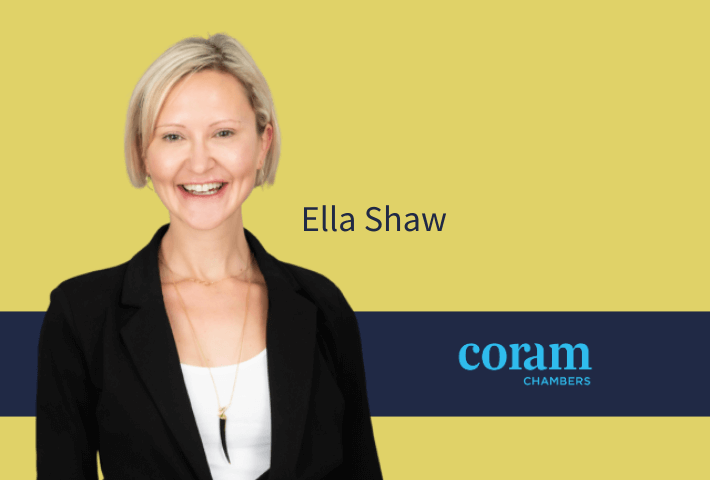Dr Bianca Jackson, the Head of Coram’s Alternative Families practice group, considers the recent decision of Bell v Tavistock for her recent article for Family Law Week.
Introduction
The decision of the High Court in Bell & Anor v The Tavistock And Portman NHS Foundation Trust [2020] EWHC 3274 (“Bell v Tavistock”) has caused a great deal of concern amongst the parents of children with gender dysphoria and trans children themselves. A link to the proceedings can be found here, but in short, the claimants, Ms Bell and Mrs A, brought a claim for judicial review against the Tavistock and Portman NHS Foundation Trust through its Gender Identity Development Service (GIDS); University College London Hospitals NHS Foundation Trust; and Leeds Teaching Hospitals NHS Trust. Ms Bell had transitioned whilst she was a patient of GIDS and subsequently de-transitioned as an adult; Mrs A was the mother of an autistic child with gender dysphoria who was concerned about her child being referred to GIDS and prescribed puberty blockers (notwithstanding that the child would not meet GIDS’ criteria and therefore this was a “theoretical” concern).
As the High Court noted early on in its judgment, the claim ultimately came down to one question: whether children and young persons can give informed consent to the administration of gonadotropin-releasing hormone agonists (GnRHa), i.e. puberty blockers. The claimants argued, inter alia, that a child under 18 years was not competent to give such consent; that the information provided by the defendants to their patients was insufficient to ensure informed consent; and that the absence of procedural safeguards and the inadequacy of information provided was an infringement of the children’s rights under Article 8 of the European Convention on Human Rights. In contrast, the defendants submitted that whilst it was patient-specific, children were capable of giving consent, depending on their age and understanding, and they made sure that the children were given all the necessary information to make that consent valid.
The Decision
The Court did not agree with the defendants. It held that it was highly unlikely that a child aged 13 or under would ever be Gillick competent to give consent to being treated with puberty blockers. Likewise, the court expressed doubt that children aged 14 and 15 years could ever have sufficient understanding of the long-term risks and consequences of treatment to give informed consent. A distinction was drawn between children under 16 years and children over 16 years, given that there is a presumption that the latter have the ability to consent to medical treatment. However, even in children over 16, the court queried whether there should be judicial oversight where such treatment takes place.
The Appeal
Once judgment was pronounced, the defendant applied to the trial judges for permission to appeal, which was denied on the basis that the grounds of appeal put forward by the defendants had no prospect of success and there was no other compelling reason why the appeal should be heard. The Court made the following declaration: “it is declared that the relevant information that a child under the age of 16 would have to understand, retain and weigh up in order to have competence to consent to the administration of puberty blocking drugs is that set out in paragraph 138 of the judgment handed down in this case on 1 December 2020.” However, the Court stayed the implementation of the order until 4pm on 22 December 2020 to allow for the defendant and/or intervenors to seek permission to appeal from the Court of Appeal, said stay to continue if permission was granted. It is understood that GIDS is seeking permission to appeal the judgment.
The Aftermath of the Decision
Subsequent to the decision of the court, the NHS made amendments to the Service Specification for Gender Identity Development Service for Children And Adolescents (E13/S(Hss)/E) [the NHS standard contract with GIDS]. The amendments include the following:
(1) Children under the age of 16 cannot be referred by the GIDS to paediatric endocrinology clinics for puberty blockers unless a “best interests” order has been made by the court for the child in question.
(2) In respect of children under the age of 16 who are already on puberty blockers as a result of a referral from GIDS, GIDS must carry out a full clinical review of each child. The timeframe for clinical reviews will be confirmed by 22 December 2020.
(3) If, upon review, the lead clinician treating the child who is under 16 determines that it is in the child’s best interests that either (a) the child should continue with puberty blockers and/or (b) the child should be administered cross sex hormones (either with or without puberty blockers), the lead clinician (through their NHS provider) must make a “best interests” application to the Court for final determination of the child’s needs.
(4) If, upon review, the lead clinician treating the child who is under 16 determines that it is not appropriate to make a “best interests” application to the court, the lead clinician must make arrangements for puberty blockers to be withdrawn within a clinically appropriate timeframe and within safe clinical arrangements.
(5) GIDS must ensure that appropriate psychosocial support and psychological therapies are available to patients who are removed from puberty blockers, and to their families and carers.
(6) For children aged 16 and 17, no court intervention will be necessary before treatment can take place provided that the child has mental capacity, the lead clinician considers the treatment to be in the patient’s best interests, and there is no parental dispute about the intervention. However, where the 16 or 17 year old is considering the administration of cross sex hormones or is already receiving cross sex hormones, the child’s lead clinician is required to review every such child’s individual circumstances, and to consider an application to the Court (through their NHS provider) for final determination of the child’s needs if there is doubt about the child’s “best interests.”
Notwithstanding the stay of the court’s decision, the amendments outlined above came into effect on 1 December 2020.
The Implications for Trans Children
As highlighted above, GIDS, in conjunction with the University College London Hospitals and Leeds Teaching Hospitals teams, will conduct a clinical review of all of its current endocrinology patients, which will commence in early 2021. In the interim, it has been agreed with the NHS that those children who are already on puberty blockers and cross-sex hormones will continue with their treatment, at least until the stay concludes. However, due to the judgment and the need for GIDS to prioritise its existing endocrinology patients, GIDS is not making any new referrals to endocrinology.
Whilst the case concerned GIDS in particular, it is likely that the judgment also applies to private providers of puberty blockers. If that is correct, private clinics will need to conduct clinical reviews of any patients under 16 and apply to the court for a “best interests” order. However, like patients at GIDS, it is presumed that children who are already on puberty blockers and cross-sex hormones can continue with their private treatment until the stay concludes.
Parental Consent
Typically, the parents of children who are not considered Gillick competent and have parental responsibility can consent to treatment on their behalf, without the need for a court order. It is a general principle that the State should be slow to interfere with how parents exercise their rights and duties with regard to their children and respect their right to do so, provided that they don’t put the child at risk of significant harm. However, GIDS’ policy is that parents cannot consent on behalf of a child to the administration of puberty blockers; the child must be competent to do so. As such, the court in Bell v Tavistock did not consider it necessary to deliberate whether parents could consent to the treatment if the child could not lawfully do so themselves. It is unclear at present whether private clinics that administer puberty blockers follow the same policy, though this has been overtaken by the decision that providers must conduct clinical reviews of all patients under 16 and apply to the court for a “best interests” decision.
Inherent Jurisdiction
As set out in the judgment, it is envisioned that where GIDS, in conjunction with the University College London Hospitals and Leeds Teaching Hospitals teams (or a private provider), undertakes a clinical review of a child and determines that the child should be placed on puberty blockers, they will apply under the inherent jurisdiction of the High Court for a “best interests” decision. Pursuant to Part 12 of the Family Procedure Rules 2010, any person with a genuine interest in or relation to the child in question can make an application relating to the exercise of the court’s inherent jurisdiction. As family practitioners will no doubt be aware, the court may in exercising its inherent jurisdiction make any order or determine any issue in respect of a child unless limited by case law or statute. This includes, inter alia, decisions about medical treatment. When making said order, the court must be satisfied that the proposed treatment is both in the child’s best interests and necessary [see, for example, Re TM (Medical Treatment) [2013] EWHC 4103 (Fam)].
The respondents to the application for a “best interests” order would be the child’s parents (or guardian), any other person who has an interest in or relationship to the child; and the child themselves, through an appointed Guardian. Though this is not addressed in the judgment, ideally the Guardian would have knowledge of gender dysphoria and the particular welfare issues that a gender dysphoric child might face. Parents may be able to access funding for legal services through the LAA for the proceedings, though this will be means and merit-tested.
Specific Issue Order
Given the burden that the court’s decision will have on the NHS and the consequences of delay for children dealing with gender dysphoria, the question arises as to whether a parent of a child under 16 who wishes to take puberty blockers – or even the child themselves – could make an application for a specific issue order under s.8 of the Children Act 1989, with GIDS, the University College London Hospitals and/or Leeds Teaching Hospitals teams invited to act as intervenors. The intention of a specific issue order is to provide directions “for the purpose of determining a specific question which has arisen, or which may arise, in connection with any aspect of parental responsibility for a child” (s.8 of the Children Act 1989). Medical treatment of a child, including the provision of puberty blockers, falls within that rubric.
Typically, specific issue orders in respect of a child’s medical treatment are made in the context of parents disagreeing about said treatment. However, this is not a prerequisite; an application for a specific issue order can be brought where all parties with parental responsibility agree on the medical treatment for the child but the type of treatment necessitates the leave of the court to be sought, for example, sterilisation. As noted by the court in Re HG (Specific Issue Order: Sterilisation) [1993] 1 FLR 587, the decision of whether a certain medical treatment should be undertaken is “a specific question” and “the fact that the question has to be answered is what gives rise to the issue, not that there are protagonists on either side of the debate” [595]. As per any application under inherent jurisdiction, it is likely that the child would be joined as a party and represented through a guardian.
Pursuant to s.10(4) of the Children Act 1989, any parent is entitled to make an application for a specific issue order. However, there is also the possibility that the child concerned could seek leave under s.10(8) to make the application themselves. S.10(8) stipulates that the court may only grant leave if it is satisfied that the child has sufficient understanding to make the proposed application for the s.8 order. In other words, the child must be Gillick competent to instruct their own legal representative; it does not necessarily follow that the child must be Gillick competent to consent to the treatment sought.
Whilst an application for specific issue order may not be the preferred or most direct route for obtaining a “best interests” decision, it is arguably a valid one. Indeed, pursuant to Practice Direction 12D of the Family Procedure Rules 2010, proceedings under inherent jurisdiction should not be commenced unless it is clear that the issues concerning the child cannot be resolved under the Children Act 1989.
Given the indication of Bell v Tavistock, it is likely that any specific issue application for the administration of puberty blockers would need to be made to the High Court. In deciding whether to grant the order, the court would be guided by s.1 of the Children Act, with reference to the welfare checklist and the paramountcy of the child’s welfare.
Conclusion
The judgment in Bell v Tavistock has raised more questions than it has answered. At present, if the decision stands, it is unclear how quickly GIDS will be able to undertake their clinical reviews of patients; what the timeline for making any “best interests” applications will be; what criteria the “best interests” application will be made under; how quickly the court proceedings can be listed and how long they will take; the financial impact these applications will have on both the NHS and the families involved; and so on. What is clear, however, is that for those children who do experience gender dysphoria and seek to transition, the decision – whether legally right or wrong – will have devastating effects.


